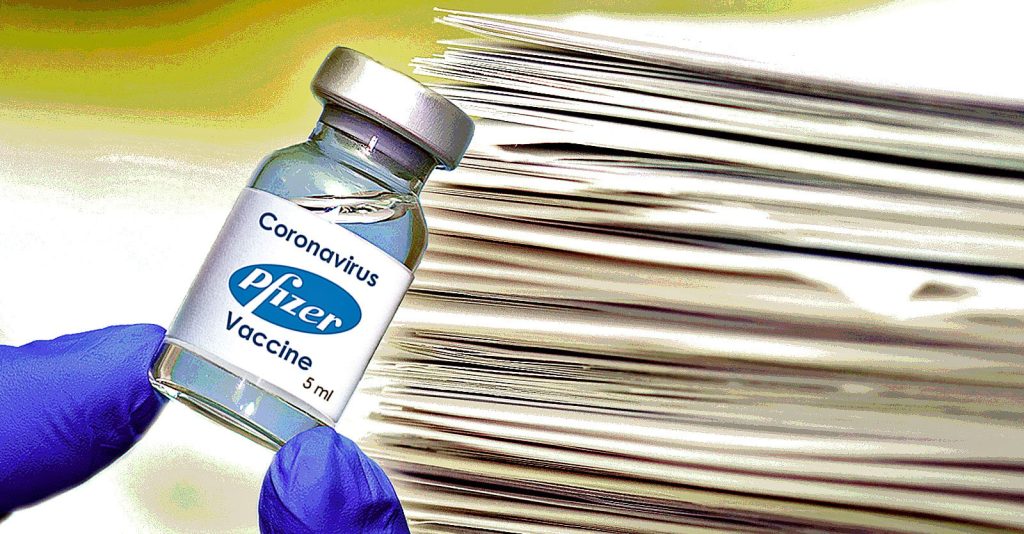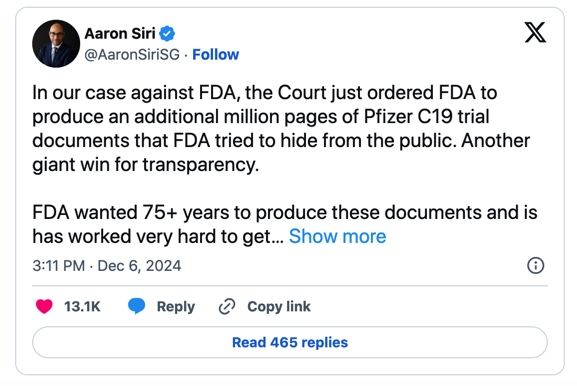“Is FDA ‘Covering for Pfizer’? Court Orders Agency to Release a Million More Pages of COVID Vaccine Documents”

A federal court last week ordered the FDA to release 1 million pages of documents related to the Pfizer-BioNTech COVID-19 vaccine, despite the agency’s efforts to block their release. The FDA has approximately six months to provide the documents.

A federal court last week ordered the U.S. Food and Drug Administration (FDA) to release one million pages of documents related to the Pfizer-BioNTech COVID-19 vaccine, despite the agency’s efforts to block their release. The FDA has approximately six months to provide the documents.
The ruling stems from a lawsuit Public Health and Medical Professionals for Transparency (PHMPT) filed against the FDA in 2021. PHMPT sued the agency after it rejected a Freedom of Information Act (FOIA) request for expedited processing of documents relating to the Pfizer-BioNTech COVID-19 vaccine clinical trials.
In January 2022, a federal court sided with PHMPT, ordering the agency to release internal documents. According to PHMPT, the FDA didn’t provide all the clinical trial documents, prompting the organization to file a motion for their release.
In an opposing motion, the FDA claimed PHMPT’s initial request sought only those documents pertaining to its licensing of the Pfizer-BioNTech vaccine, not the emergency use authorization (EUA) that preceded licensure. The FDA asked the court to release the agency from any obligation to provide additional documents.
The Dec. 6 ruling by U.S. District Judge Mark T. Pittman rejected the FDA’s claim, ordering the FDA to “produce the responsive EUA file on or before June 30, 2025.”
Pittman’s ruling quoted Patrick Henry, a key figure in the American Revolution: “The liberties of a people never were, nor ever will be, secure, when the transactions of their rulers may be concealed from them.”
“The Covid-19 pandemic is long passed and so has any legitimate reason for concealing from the American people the information relied upon by the government in approving the Pfizer Vaccine,” Pittman added.
Medical, legal experts welcome the ruling
Aaron Siri, an attorney representing PHMPT, called the ruling “Another giant win for transparency.”

“FDA clearly lacks confidence in the review it conducted to license Pfizer’s Covid-19 vaccine because it is doing everything possible to prevent independent scientists from conducting an independent review,” Siri posted on X.
Naomi Wolf, CEO of Daily Clout and author of “The Pfizer Papers: Pfizer’s Crimes Against Humanity,” analyzed the initial batch of FDA documents. She told The Defender the ruling is “another important victory in securing the immediate release of a million new documents from Pfizer.”
Writing on Substack, Dr. Meryl Nass, founder of Door to Freedom, said, “It turned out FDA was hanging on to … the entire EUA file. The juiciest materials had not been released. The EUA file contained FDA’s evaluation (and probably all other materials) of the Pfizer clinical trial, which we now know bent a lot of rules.”
Noting that the initial tranche of documents the FDA released contained many duplicate documents and suggesting the FDA was trying to “pull a fast one,” Nass asked, “Why would it need an official release from further production … unless there was further production that it was withholding?”
FDA ‘obviously covering for Pfizer’
According to Pittman’s ruling, “Vaccines are approved for marketing through applications known as Biologics License Applications (‘BLA’).” It stated:
“BLAs include various information and data, including: (1) nonclinical and clinical data; (2) information about manufacturing methods and locations; (3) data establishing stability of the product through the dating period; (4) summaries of results from tests performed on the lots of representative samples of the product; and (5) mockups of the labels, enclosures, medication guide if proposed, and containers as applicable. …
“If the FDA determines that the BLA meets the statutory and regulatory requirements, the FDA will issue a biologics license for the product, authorizing the sponsor of that particular BLA to market that new product.”
The BLA process is distinct from the process of granting an EUA, the ruling noted. This process is governed under the Project BioShield Act of 2004 and gives the FDA authority to grant emergency approval to “certain medical products — such as vaccines — during public health emergencies, according to the ruling.
“The level of scrutiny afforded to a vaccine seeking EUA approval varies significantly from what is considered normal for FDA approval,” Pittman said in his ruling. “Generally, EUA applications require data supporting — not proving — safety and effectiveness, with lower standards and faster reviews than normal FDA approval.”
In its motion opposing the release of the documents, the FDA claimed, “the EUA file does not fall within Plaintiff’s FOIA request because the BLA and EUA are separate applications that are subject to different standards and, thus, a FOIA request for one does not necessitate production of the other.”
Pittman rejected this argument. Conceding that the FDA is correct that the two applications are distinct, he wrote it is nevertheless evident that the documents PHMPT requested included “‘all data and information submitted with or incorporated by reference in any [BLA],’ as well as ‘other related submissions.’”
According to the court, the BLA the FDA granted to Pfizer-BioNTech “incorporated and relied heavily on the EUA.” As such, the ruling stated that the BLA and EUA documents are “related.”
Ray Flores, senior outside counsel to Children’s Health Defense, told The Defender that after the declaration of a public health emergency, “safety and efficacy shortcuts for medical countermeasures are permitted via EUA.”
“By withholding and redacting, the FDA is obviously covering for Pfizer while trying to cover itself, since FDA maintains sole power to revoke the Pfizer-BioNTech EUA,” Flores said. “The reluctance to release these data proves to me that there is fear that the public will become even more aware that the FDA has failed and continues to fail in its duty to protect us.”
Documents may bring us ‘a step closer to learning who rules America’
In late 2021, the FDA argued that it needed 75 years to redact and produce the documents PHMPT requested. A federal court rejected this argument, approving their expedited release and giving Pfizer eight months to furnish the documents. A total of 1,200,874 pages of records have since been released, according to the ruling.
PHMPT, a group of more than 60 medical and public health professionals and scientists from institutions such as Harvard, Yale and UCLA, has published those documents on its website.
“FDA wanted 75+ years to produce these documents and … has worked very hard to get there, this time by hiding a million pages from the Court and the plaintiff,” Siri tweeted.
Nass told The Defender the FDA “attempted a fraud on the court” by “failing to produce documents it knew it was required to make public, based on the original court ruling and FDA law” and “tried to trick the court into acquiescing with its partial production.”
Nass accused the FDA of being “desperate” to conceal documents that indicated it expedited the licensure of the Pfizer-BioNTech vaccine to facilitate the Biden administration’s desire, in August 2021, to impose vaccine mandates.
“Immediately after the Comirnaty” — the fully licensed version of Pfizer’s COVID-19 shot — “license was issued (within days) mandates were issued,” Nass said.
“The only scientific — and ethical — justification to impose a vaccine mandate is to stop transmission,” Nass said. Yet, the FDA “knew the vaccine did not stop transmission when the vaccine was licensed and when it was mandated” — and is now attempting to cover up this information, Nass added.
According to Nass, the FDA might also have been trying to conceal information about the problematic clinical trials of the COVID-19 shots, its inaction on serious adverse events and DNA contamination in the shots.
“As Judge Pittman noted, the language in the original ruling was crystal clear,” Nass wrote on Substack. “And I would point out that the law is also clear regarding the requirement to put the entire package of documents used in a licensing decision in the public domain, once a product is licensed.”
Wolf, whose book, “The Pfizer Papers,” contains an analysis of the previously released FDA documents, previously told The Defender that Pfizer and the FDA were aware of the inadequacies of the COVID-19 vaccine trials and the prevalence of serious side effects, but the FDA tried to hide the data.
In an interview last month on “The Defender In-Depth,” Wolf said the documents revealed evidence of “catastrophic” vaccine injuries, including turbo cancers, and serious side effects that many pregnant women experienced, including miscarriages.
Wolf assembled a team of scientists who volunteered to analyze the previously released documents. She told The Defender that, for the new documents, “We will of course be able in principle to review these documents and issue the historic, politically significant reports as in the past.”
However, to accomplish this, Wolf said “We must solicit resources from the administration or from the public or from our potential partners, or all three,” as analyzing these documents is “extremely labor-intensive.”
Nass questioned whether the FDA will “fully release all its records in response to this second court order.” She said if the documents are fully released, this will bring us “a step closer to learning who rules America.”
One of our country’s most important freedoms is that of free speech.
Agree with this essay? Disagree? Join the debate by writing to DailyClout HERE.




